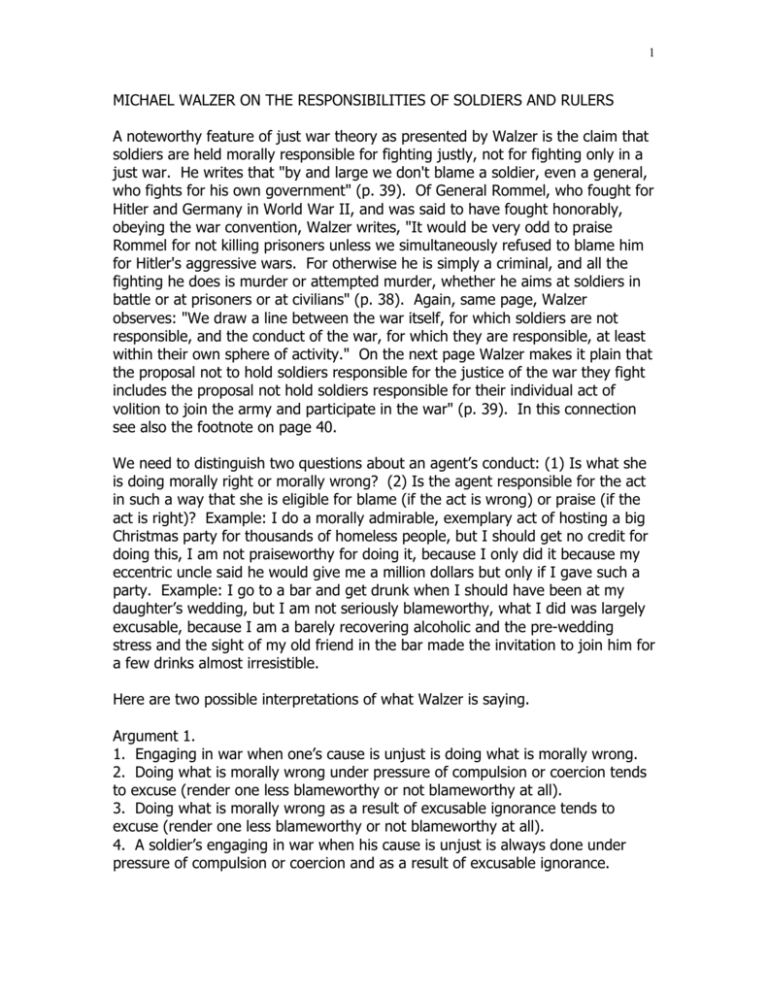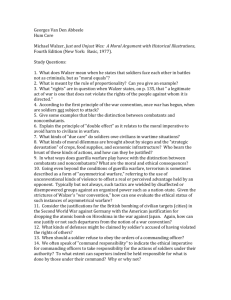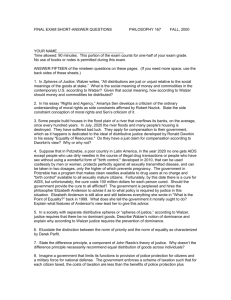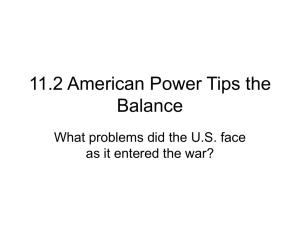Walzer on the Responsibilities of Soldiers and Rulers.
advertisement

1 MICHAEL WALZER ON THE RESPONSIBILITIES OF SOLDIERS AND RULERS A noteworthy feature of just war theory as presented by Walzer is the claim that soldiers are held morally responsible for fighting justly, not for fighting only in a just war. He writes that "by and large we don't blame a soldier, even a general, who fights for his own government" (p. 39). Of General Rommel, who fought for Hitler and Germany in World War II, and was said to have fought honorably, obeying the war convention, Walzer writes, "It would be very odd to praise Rommel for not killing prisoners unless we simultaneously refused to blame him for Hitler's aggressive wars. For otherwise he is simply a criminal, and all the fighting he does is murder or attempted murder, whether he aims at soldiers in battle or at prisoners or at civilians" (p. 38). Again, same page, Walzer observes: "We draw a line between the war itself, for which soldiers are not responsible, and the conduct of the war, for which they are responsible, at least within their own sphere of activity." On the next page Walzer makes it plain that the proposal not to hold soldiers responsible for the justice of the war they fight includes the proposal not hold soldiers responsible for their individual act of volition to join the army and participate in the war" (p. 39). In this connection see also the footnote on page 40. We need to distinguish two questions about an agent’s conduct: (1) Is what she is doing morally right or morally wrong? (2) Is the agent responsible for the act in such a way that she is eligible for blame (if the act is wrong) or praise (if the act is right)? Example: I do a morally admirable, exemplary act of hosting a big Christmas party for thousands of homeless people, but I should get no credit for doing this, I am not praiseworthy for doing it, because I only did it because my eccentric uncle said he would give me a million dollars but only if I gave such a party. Example: I go to a bar and get drunk when I should have been at my daughter’s wedding, but I am not seriously blameworthy, what I did was largely excusable, because I am a barely recovering alcoholic and the pre-wedding stress and the sight of my old friend in the bar made the invitation to join him for a few drinks almost irresistible. Here are two possible interpretations of what Walzer is saying. Argument 1. 1. Engaging in war when one’s cause is unjust is doing what is morally wrong. 2. Doing what is morally wrong under pressure of compulsion or coercion tends to excuse (render one less blameworthy or not blameworthy at all). 3. Doing what is morally wrong as a result of excusable ignorance tends to excuse (render one less blameworthy or not blameworthy at all). 4. A soldier’s engaging in war when his cause is unjust is always done under pressure of compulsion or coercion and as a result of excusable ignorance. 2 5. A soldier’s engaging in war when his cause is unjust is always done under two conditions that tend to excuse. 6. These two conditions, alone or together, suffice always to render a soldier’s engaging in war when his conduct is unjust entirely excusable and nonblameworthy. 7. If what one does is entirely nonblameworthy, one should not to be blamed. 8. A soldier who engages in war when his cause is unjust should never be blamed. OR Argument 2 1. In some circumstances the fact that one acts under coercion or compulsion may justify one’s act, which would otherwise have been wrong. 2. In some circumstances the fact that one acts as a result of excusable ignorance may justify one’s act, which would otherwise have been wrong. (Comment: Consider a bank teller who, when the robber threatens, “Give me the money in the till or I’ll kill you,” complies with the threat. This act may be responsible, right, and praiseworthy. Refusing to give the money to the robber might be foolish, and there is no sensible alternative other than compliance. Here the act of giving the money to the robber would have been wrong except for the fact that the teller is under coercive threat. In a similar way, we might say carefully helping a frail old man across a busy street is responsible, right, and praiseworthy, given the act is done under excusable circumstance of the unfortunate fact that leading the man into the street at this moment will result in his death under the wheels of a suddenly appearing bus. If the act were not done in excusable ignorance of the actual results it will produce, the act would have been wrong.)) 3. A soldier’s engaging in war when his cause is unjust is always done under coercion or compulsion and as a result of excusable ignorance. 4. In the circumstances in which soldiers engage in war when their cause is unjust, their acts—done under coercion or compulsion and as a result of excusable ignorance—are always morally justified. 5. In the circumstances in which soldiers engage in war when their cause is unjust, their acts would always be morally unjustified, except for the facts that they are done under coercion or compulsion and as a result of excusable ignorance. Either way we construe what Walzer is saying, is the argument reasonable? Or should we object to the premises or the logic? Some possible aspects of Walzer’s position that might be vulnerable: 3 1. It may be that Argument 1 is the more sympathetic construal of Walzer’s view. A problem for Argument 2 is that unlike in the bank teller case, where in the circumstances we think the best thing for the teller to do is comply with the threat, in the circumstances of being on the side that is in the wrong, we think the best thing for the soldier to do is refuse to fight, not engage in the unjust war. Don’t we think this? 2. We may accept that in principle acting under compulsion or coercion and as a result of excusable ignorance can render one entirely morally blameless or morally justified. But we might doubt any of premises 4-6 in argument 1 or premises 3-4 in argument 2. Coercion/compulsion and excusable ignorance are not always part of the explanation of why soldiers engage in a particular unjust war, and even when thy are present, they do not always rise to a level that excuses or justifies. Sometimes the political rulers who command the agent to go to war are not in fact threatening dire penalties in the event of noncompliance. Compulsion or coercion may not always be present to any very great extent. Moreover, in ordinary life, compulsion or coercion has to rise to a high level to excuse or justify killing. If the bad man threatens credibly to kill me unless I kill two innocent people, and I kill two innocent people, what I do is wrong, and probably blameworthy. If the bad man threatens just to break my knees, and to avoid this penalty I kill two innocent people, I am definitely blameworthy. Much the same may be true of excusable ignorance. Sometimes political rulers say, “Go fight for the nation! Our cause is just.” But most people may know the rulers are lying or making unjustified claims. Sometimes the political rulers, announcing war, might not even try to present the conflict as morally justified. They say, “Our glorious army will conquer its puny enemies. We are strong and they are weak.” Here there does not seem much room for excusable ignorance of the fact that one’s cause is unjust. In a democracy with free speech, citizens have the opportunity, and some would say the responsibility, to learn the relevant facts and make up their own minds as to whether the nation’s engagement in any war they are asked to support and fight is just or unjust. If they don’t use the available means for learning that the war effort is unjust (if that is the case), then when they go to war thinking their cause is just, their ignorance may well not be excusable. One might think that there is a strong presumption on general grounds in favor of refraining from killing people. A powerful argument is needed to overcome this presumption. (If my wife says to me, “Kill the neighbors!”, even though I think she is a nice, reasonable person, and usually speaks the truth, I should demand a much more complete account of the grounds for killing and I should 4 check the facts and assess the argument for myself before I could possibly be justified in killing the neighbors.) This presumption still holds when what is at issue is killing by soldiers in war. Also, one might well conclude from the historical record that most wars are unjust on all sides, so there should not be a general inclination to believe that if any political ruler says “Our cause is just, and our war effort is moral and right,” what she says is probably true. The general presumption should be that if one’s nation goes to war, one is morally responsible for thinking through for oneself whether the cause is just and is morally at fault if one deliberates and reasons badly and in consequence joins an unjust war effort and furthers evil aims. 3. One might try to defend the convention that soldiers who surrender are not to be killed or punished on consequentialist grounds. If we hold soldiers criminally liable for failure to obey (what the other side in the conflict sees as) the moral law that forbids unjust killing, then soldiers will have more incentive to fight to the last man rather than surrender. So perhaps the ground for the rule about soldiers and surrender is justified on consequentialist grounds. This is one among several rules limiting war and (it is hoped) limiting the carnage and destruction that wars will cause. The failure to find an attractive and coherent deontological ground for the rules of war does not mean they lack any possible moral rationale. From a consequentialist standpoint, how should one interpret the distinction between rules of war (like "don't fight with feathered arrows") that Walzer regards as genuinely conventional and binding only on the condition that others accept and follow the rules along with oneself and basic rules like noncombatant immunity that are not conventional in this sense? The consequentialist should say this is just the distinction between rules that are expected to have good consequences only if accepted by all sides and rules of war that may be expected in the long run to have good consequences even when compliance is one-sided. ("The enemy shoots prisoners and does not take captives, but we still should accept a soldier's surrender and not kill or mistreat captives.") The calculations of long-run consequences on which consequentialist moral imperatives are based seem iffy and uncertain, but the consequentialist will say the morality of war and rules of war are iffy and uncertain. This is a problem of life, not a defect in consequentialist theory. Further comment: There may be tension between Walzer’s view that soldiers are not responsible for fighting only in just wars and his upholding of the rule of noncombatant immunity. If soldiers are no more guilty of the crime of war than civilians, why is it always wrong, if one is fighting a just war, deliberately to attack civilians (even if terrorizing civilians is the best way to win the war and vindicate the cause of justice)? On this issue, see Walzer’s full account of the rule of noncombatant immunity in chapters 8-9. 5 Final comment: One might turn this last point around and use it to defend Walzer's position on this matter. A firmly entrenched convention of war fighting, part of what Walzer calls the "war convention," is the view that once a soldier surrenders, he has the right not to be killed or mistreated. He may be kept in a stockade under guard until the war's end, but he is not to be regarded as guilty of unjust war and liable to criminal punishment at the hands of his captors. Walzer is saying, these judgments presuppose something close to the view of the moral responsibilities--and immunities from responsibility--of soldiers that he is defending. The consequentialist ideas raised in comment 3 above will not under examination make sense of the rules of war we most firmly endorse or of our reasons for endorsing them. This would be one line of argument a defender of Walzer's position might pursue.






